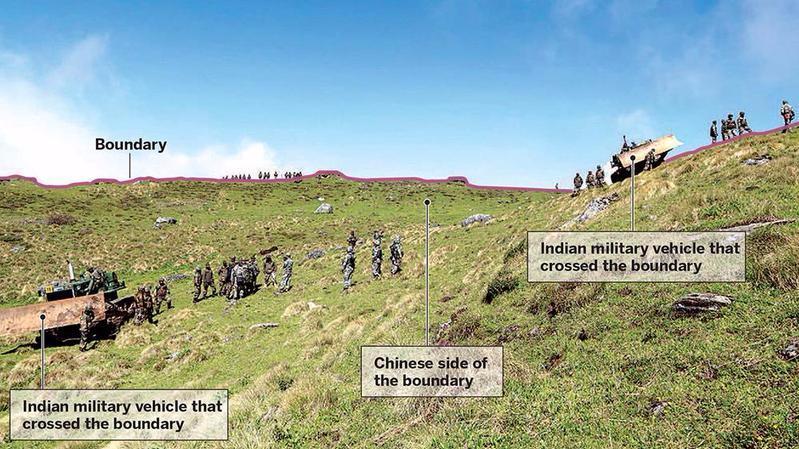
The Washington Post reports: "India and China have withdrawn troops from a disputed Himalayan region on the border with China, foreign ministries from the two countries announced Monday, defusing a tense standoff that had threatened to provoke armed conflict between the nuclear-armed Asian rivals. For the past two months, Indian and Chinese troops had faced off on a plateau in the Doklam area in the Himalayas... On Monday, the two sides announced they had reached an agreement, with India saying its troops were disengaging, and China saying it would redeploy forces in response. By the evening, India said both sides had almost completed their withdrawal. But it was not clear from both sides' public statements if Beijing had offered any concessions in return for the Indian withdrawal, such as agreeing to halt the construction of the road. China said it would continue to patrol and garrison the area — as well as exercise its sovereign rights."
- Quartz reports: "The Chinese government under president Xi Jinping is continuing to make life on the internet difficult for its potential detractors. On Aug. 25, the country's highest internet regulator released new rules that govern who can post what online. The upshot: anonymity on the Chinese internet is just about dead. The new rules are the most recent instance of the Cyberspace Administration of China's (CAC) efforts to enforce 'real-name registration,' which aims to severely limit internet activity for users who do not provide identifying information. There are already rules in place that require using your real name to register for WeChat, mobile phone numbers, Weibo, and other services for a few years. But the latest rules target the relatively unruly world of online communities and discussion forums. 'For users who have not given identifying information, platforms for and providers of online communities may not allow posting of any kind,' the announcement declares. It adds that, on these platforms, 'no content may appear that is prohibited by national regulations.'"
- Financial Times comments: "For those who have long warned about a growing US dependence on Chinese supply chains, Donald Trump is their moment in the sun. Last month the US president ordered a review of the country's defence supply chain, claiming it faced gaps due to a loss of manufacturing jobs over the past decade. Only one company in the US can now repair propellers for Navy submarines, his administration said. Rare earths, 17 elements that are used in magnets for wind turbines and electric-vehicle motors, as well as in military lasers and missiles, are core to the debate, since China has an almost complete monopoly over their supply... China has used its rare earth monopoly to capture the broader technological supply chain in order to get 'a tight grip on the beating heart of American enterprise'. For Victoria Bruce, globalisation has put America at risk and made the country vulnerable... US willingly offered up its technology, starting in the free-market heyday of the 1990s as one multinational corporation after another moved into China, believing they would have access to its growing domestic market. China realised it could obtain foreign military and industrial technology by buying it, licensing it or forcing foreign companies to do joint ventures."
- 2017-08-27 Chicago Exchange Sale Looks Shaky as China Tensions Rise
- 2017-08-25 China’s Big Businesses Risk Trump’s Punishment Over North Korea
- 2017-08-24 China to use ‘all means necessary’ to defend itself against Trump ‘protectionism’
- 2017-08-23 China demands U.S. immediately withdraw N. Korea sanctions, warns will hit ties
- 2017-08-22 US targets Chinese, Russian entities funding North Korea's nukes
- 2017-08-21 Bannon exit provides only temporary relief to China
- 2017-08-20 China has more to lose in US trade showdown, says report
- 2017-08-18 China Steps Up Warnings Over Debt-Fueled Overseas Acquisitions
- 2017-08-17 Steve Bannon, Unrepentant
- 2017-08-16 U.S. and China Ink Military Agreements; Mattis And His Troop Talk
- The Washington Post India, China agree to pull back from tense border dispute, but terms unclear
- Quartz In China you now have to provide your real identity if you want to comment online
- The New York Times China and India Agree to Ease Tensions in Border Dispute
- CNN Trump to aides: 'I want tariffs'
- Reuters Braving security fears, Chinese seek 'Silk Road' riches in Pakistan
- The Wall Street Journal The Big Name in Coal's Resurgence: China
- Reuters China says sanctions won't help as Trump targets Venezuela
- Business Insider China is planning a crackdown on ICOs, the red-hot digital-coin-issuing trend
- Quartz China's newest answer to Disneyland is a mish-mash of Eastern and Western myth and fantasy
- CNBC China just approved the world's largest power company with more than 225 gigawatts of capacity
- Quartz China's trendiest hotpot chain is winning praise for admitting it ran a rat-infested kitchen
- Reuters China says nuclear safety law ready to be passed
- NBC News Dandong, China: Mecca For North Korean Tourism and Trade
- Bloomberg China State Airlines Find Out Home Is Where the Profits Are
- Financial Times China's quest to catch up with the west
- Foreign Policy China Is Trying to Give the Internet a Death Blow
- China Law Blog China Product Sourcing: Being There
- Lawfare Tentative Observations on China's Views on International Law and Cyber Warfare
- The National Interest China Is Weaponizing Water
- Project Syndicate America and China's Codependency Trap
- Seeking Alpha Why Starbucks Is A Very Risky Bull In China's Shops
